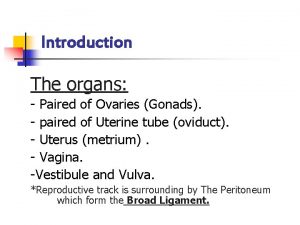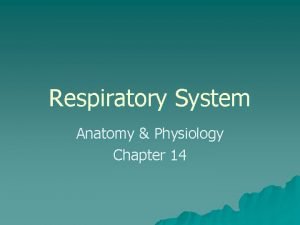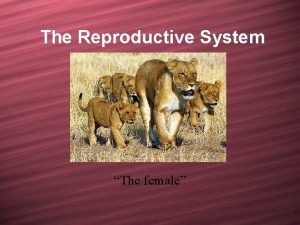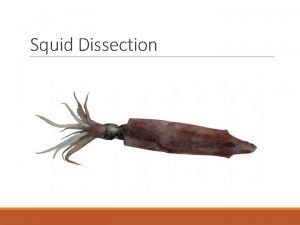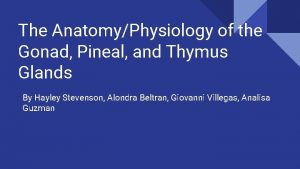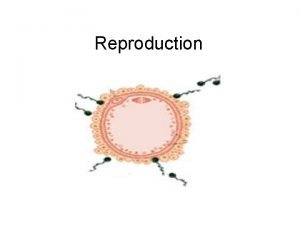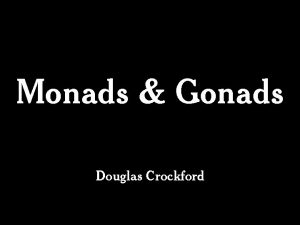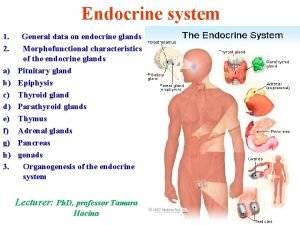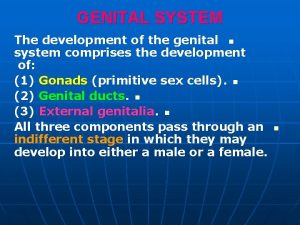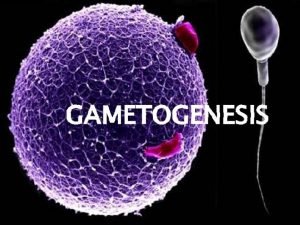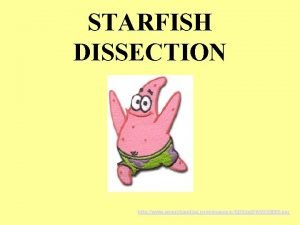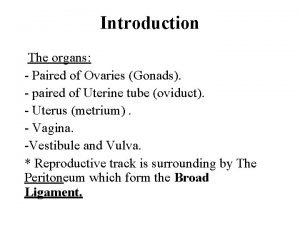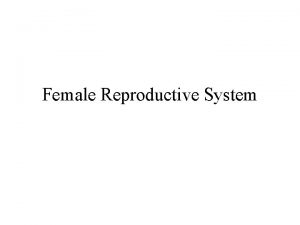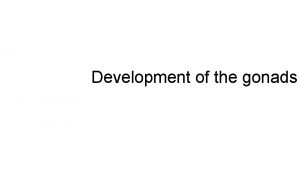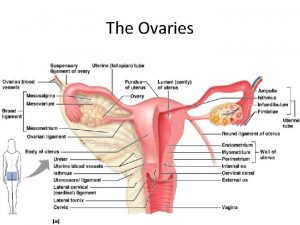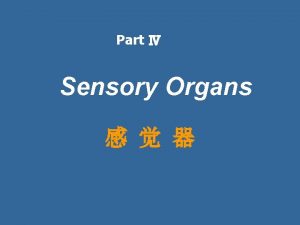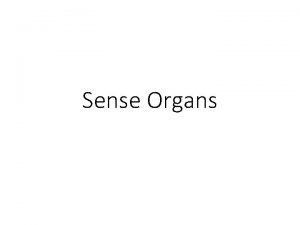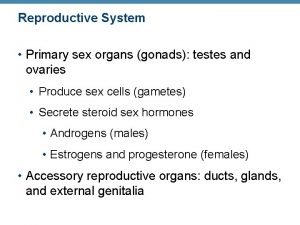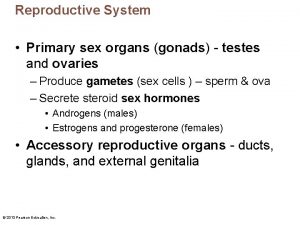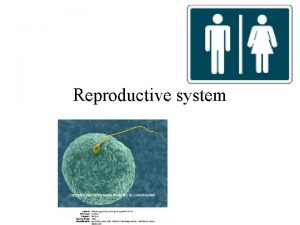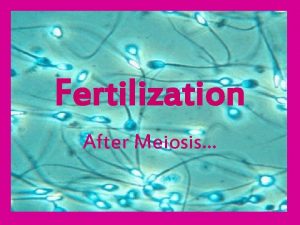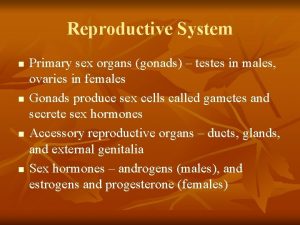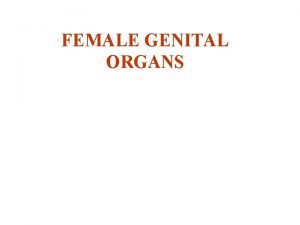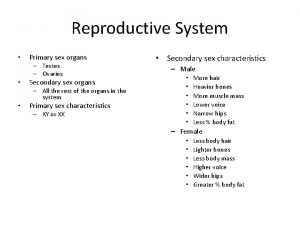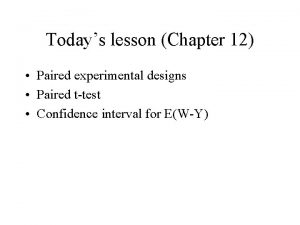Introduction The organs Paired of Ovaries Gonads paired





















































- Slides: 53

Introduction The organs: - Paired of Ovaries (Gonads). - paired of Uterine tube (oviduct). - Uterus (metrium). - Vagina. -Vestibule and Vulva. *Reproductive track is surrounding by The Peritoneum which form the Broad Ligament.




Broad Ligament Double fold of Peritoneum link and support the ovaries , uterine tubes and uterus. Transmits the blood vessel and nerves. Position : extend from the dorsolateral body wall to ovaries , uterine tubes and uterine body. Regions : n n n n Mesovrium : is the portion of broad ligament which support the ovary. Mesosalpinx : is the portion of broad ligament which support the uterine tube (salpinx). Mesometrium : the area of broad ligament which support Uterine horns and Uterine body (largest portion ). Ovarian Bursa : Pouch between Mesosalpinx and Mesovrium


Ovary n n n Position: lies near the dorsal body wall and most caudal part in abdominal cavity and close to pelvic inlet. Shape: ovoid form. Attachment: 1. Suspensory Ligament : extend between cranial pole of each ovary and dorsal body wall to the region just caudal to last rib. 2. Proper Ligament of Ovary : extend between ovary and tip of Uterine horn. And continues cranially with Suspensory Ligament of Ovary and caudally with Round Ligament of Uterus. 3. Mesovarium.



Ovarian tube (salpinx) n n n Fallopian tube , Oviduct. Fine tubular structure extending from the Ovary to Uterine horn. Each uterine tube originated on the medial surface of the Ovary , passes cranially and then turn around the cranial ovarian pole to course caudally along the lateral ovarian surface to gain the tip of Uterine horn. Surrounding by Mesosalpinx. Consist of tree main parts: 1. Infundibulum. 2. Ampulla. 3. Isthmus.

Ovarian tube 1. Infundibulum: n n The free cranial extremity takes the form of a thin-walled funnel place close to cranial pole of ovary. The free edge of funnel is ragged by Fimbria finger like projection to collect the egg’s at ovulation.

Ovarian tube 2. Ampulla: n n n Middle part. has large diameter compared to isthmus. Where the Fertilization process occurs. 3. Isthmus: n the part closet to Uterine Horn and connected to it. n Thicker than the Ampulla.

Ovarian tube n Tow Junction : 1. Ampullary-isthemaic Junction : n between the Ampulla's and the Isthmus. 2. Uterotubal Junction : (salpinogouterine) n n between the Ampulla's and the Uterine Horn. is Gradual in Ruminant and Pigs.


Ovarian tube


Uterus n n Enlarged part of the tract in which embryos come to rest Divided in to 3 parts: 1. Uterine Horn : n n n 80 -90% length of uterus in Ruminant. The junction between 2 horns make uterine body. Disposition also varies (in Ruminant). 2. Uterine body : n n small in ruminant. Area common to both sides of female tract. 3. Cervix.

Uterus n n n Uterine caruncles : The attachment sites of fetal membrane in the pregnant state found in Uterine horn. where the tow horns diverge , the superficial tissue bridge the space between them , forming dorsal and ventral Intercornual Ligaments. Round ligament of the Uterus: a cord of fibrous and smooth m. passes from the tip of uterine horn to the Inguinal Canal.


Uterus n Bicornuate uterus : 1. this type in Ruminant. 2. have long Uterine horns and small Uterine Body.


Cervix n n n Portio Vaginalis. Lies within the pelvic cavity interposed between the Rectum and the Bladder , but the Uterine horn and uterine body lies within abdominal cavity. Very thick-walled segment Thickened partition at the junction between the Uterine body and Vagina. Hold the Uterus closed all the time (other than during the estrus and parturition).

Cervix n n The lumen of cervix closed by the interlocking of irregular surface projection (Annular rings). Annular rings n n cow: 3 -4 rings. doe: 5 rings. ewe: 6 -7 rings. Fornix: blind sac formed by cervix protruding into vagina.

Cervix


Vagina Divided in 2 part : 1. Anterior Vagina : cranial part, run from the Cervix to the Urethral orifice. 2. Vestibule (posterior Vagina) : caudal part, run from Urethral orifice to the external Vulva. n

Vagina (Anterior Vagina) n n n Long , thin walled tube. It occupies a median position within the pelvic cavity, related to the Rectum dorsally and the Bladder & the Urethra ventrally. Retroperitoneal. The intrusion of the cervix into the cranial part of the vagina reduces the lumen of this part to ring like space known as the Fronix. The junction of Vagina and Vestibule is supposedly marked in virgin animals by transverse mucosal fold called “ HYMEN”




Vestibule and Vulva n External Genitalia of Female. I. Vestibule n n n Run from Urethral orifice to the external Vulva. The wall less elastic than those in the Vagina. The Urethra orifice associated with blind pocket a Suburethral diverticulum (in Ruminant) Vestibular wall are marked by the entrance of the ducts of Vestibular Glands (in Ruminant). region common to reproductive & urinary systems.

Vestibule and Vulva n Vestibular Glands : (Bartholin's gland) 1. In cow : a large glandular mass to each side drains by a singular duct. 2. In ewe : both minor and major Vestibular glands are present. 3. These glands produce a mucous secretion that lubricates the Vestibule.


Vestibule and Vulva n The vestibule wall is exceptionally well vascularized with concentration of veins forming a lateral patch of erectile tissue know as “ Vestibular bulb “ and regardeds the homologue of the penis.



Vestibule and Vulva II. Vulva: The vertical vulva opening is bounded by Labia that meet at dorsal and ventral commissures. 1. Dorsal commissure : is rounded. 2. Ventral commissure : pointed and raised above the level of surrounding skin. n

Vestibule and Vulva n The Labia : tow Labia 1. Labia minora: n Inner folds , Small in ruminant. 2. Labia majora: n Outer folds , Externally visible.

Vestibule and Vulva n The Clitoris : n n n Homologous to penis. Lies within the Ventral commissure. Highly innervated by nerve endings.

Urogenital Diaphragm n n Perineal membrane. Membrane which close the hiatus between the rectovaginal septum and the caudal margin of the pelvic, and the strong fascia of diaphragm arise from the Ischial arch and bends dorsally around the vestibule and fuse with it.




Blood Supply n Arteries: 1. ovarian a. : direct branch of Abdominal Aorta , which supply the Ovary, uterine tube, and cranial part of Uterine Horn. 2. Uterine a. : Aries as indirect branch of the Internal iliac a. which supply the Uterine Cervix , Body , Horns 3. Vaginal a. : supply the Uterus and Vagina

Blood Supply 4. Internal pudendal a. : Supply the caudal part of reproductive tract ( clitoris, Vestibular bulb, 5. External pudendal a. : Supply the labia


Blood Supply n Veins : 1. Left Ovarian v. : enter the left renal v. 2. Right Ovarian v. : enter the caudal vena cava. 3. Uterine v. 4. Vaginal v. n The close relation between the ovarian artery and ovarian vein provide a means of the countercurrent transfer of Prostaglandin from veins blood to arterial blood. (in ruminant and sow)


Lymphatic Drainage n n n Efferent lymphatics from the ovary and uterine tubes drain to the Lumber lymph nodes. Efferent lymphatics from the uterus enter the Hypogastric and Lumber lymph nodes. Efferent lymphatics from the vulva and the clitoris enter to the Superficial inguinal lymph nodes.

Innervation n n Both sympathetic and parasympathetic nerves supply the genital tract. Innervation to the ovary by Sympathetic nerves from the aortiocorenal plexuses. Innervation to the uterine tube by Sympathetic nerves from the aortiocorenal plexuses. Innervation to the uterus by Sympathetic innervation arrives via the right and left Hypogastric n. which extend from the caudal mesenteric plexus to the pelvic plexus.

Innervation n n Innervation to the uterine tube by Parasympathetic nerves from the Pelvic plexus. Innervation to the Uterus by Parasympathetic nerves arrives more directly from the Pelvic n. of the Pelvic plexus.

Innervation n Innervation to the Vulva: n Autonomic innervation: Both sympathetic and parasympathetic nerves supply the vulva (extend from the Pelvic Plexus ) n Somatic innervation : pudendal and Genito. Femoral nerves provide somatic sensory innervation to the Labia.

Innervation n Innervation to the Clitoris : n the Dorsal nerve of the Clitoris (branch of pudendal nerve ) provide somatic sensory innervation.
 Major vestibular gland
Major vestibular gland Description of the larynx
Description of the larynx Soft paired cone shaped organs
Soft paired cone shaped organs Functions of an ovary
Functions of an ovary Distinguish between ova, ovaries, and ovulation
Distinguish between ova, ovaries, and ovulation Female squid internal anatomy
Female squid internal anatomy Corpus luteum
Corpus luteum Gonads glands
Gonads glands What ate gonads
What ate gonads What is gonad
What is gonad Spermogensis
Spermogensis Monads and gonads
Monads and gonads Gonads glands
Gonads glands Thyroid
Thyroid Gonads
Gonads Define the gametogenesis
Define the gametogenesis Ambulacral ridge starfish
Ambulacral ridge starfish Hát kết hợp bộ gõ cơ thể
Hát kết hợp bộ gõ cơ thể Lp html
Lp html Bổ thể
Bổ thể Tỉ lệ cơ thể trẻ em
Tỉ lệ cơ thể trẻ em Gấu đi như thế nào
Gấu đi như thế nào Chụp phim tư thế worms-breton
Chụp phim tư thế worms-breton Bài hát chúa yêu trần thế alleluia
Bài hát chúa yêu trần thế alleluia Các môn thể thao bắt đầu bằng tiếng đua
Các môn thể thao bắt đầu bằng tiếng đua Thế nào là hệ số cao nhất
Thế nào là hệ số cao nhất Các châu lục và đại dương trên thế giới
Các châu lục và đại dương trên thế giới Công thức tiính động năng
Công thức tiính động năng Trời xanh đây là của chúng ta thể thơ
Trời xanh đây là của chúng ta thể thơ Mật thư anh em như thể tay chân
Mật thư anh em như thể tay chân 101012 bằng
101012 bằng Phản ứng thế ankan
Phản ứng thế ankan Các châu lục và đại dương trên thế giới
Các châu lục và đại dương trên thế giới Thể thơ truyền thống
Thể thơ truyền thống Quá trình desamine hóa có thể tạo ra
Quá trình desamine hóa có thể tạo ra Một số thể thơ truyền thống
Một số thể thơ truyền thống Cái miệng nó xinh thế chỉ nói điều hay thôi
Cái miệng nó xinh thế chỉ nói điều hay thôi Vẽ hình chiếu vuông góc của vật thể sau
Vẽ hình chiếu vuông góc của vật thể sau Nguyên nhân của sự mỏi cơ sinh 8
Nguyên nhân của sự mỏi cơ sinh 8 đặc điểm cơ thể của người tối cổ
đặc điểm cơ thể của người tối cổ Thế nào là giọng cùng tên? *
Thế nào là giọng cùng tên? * Vẽ hình chiếu đứng bằng cạnh của vật thể
Vẽ hình chiếu đứng bằng cạnh của vật thể Tia chieu sa te
Tia chieu sa te Thẻ vin
Thẻ vin đại từ thay thế
đại từ thay thế điện thế nghỉ
điện thế nghỉ Tư thế ngồi viết
Tư thế ngồi viết Diễn thế sinh thái là
Diễn thế sinh thái là Dạng đột biến một nhiễm là
Dạng đột biến một nhiễm là Số nguyên tố là
Số nguyên tố là Tư thế ngồi viết
Tư thế ngồi viết Lời thề hippocrates
Lời thề hippocrates Thiếu nhi thế giới liên hoan
Thiếu nhi thế giới liên hoan ưu thế lai là gì
ưu thế lai là gì
